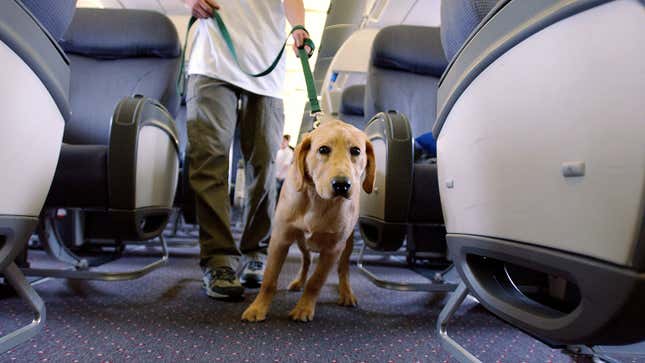Blind Travelers Kicked Off Flights Due To Confusing Service Animal Rules

Service animals are essential for many people with different needs who still need to navigate the outside world, including air travel. But a crack down on fake service animals boarding flights is hitting those who actually rely on the animals hard.
The BMW Alpina XB7 Simply Rips | Jalopnik Reviews
The Department of Transportation tried to clamp down on fake service animals and “emotional support” animals boarding flights with new regulations back in 2021, according to the Washington Post. The measure was meant to prevent people taking animals, such as peacocks or even miniature horses, needlessly on flights. But while the new rules did stop some people from, say, attempting to board a plane with a snake, they have made it much harder for people who actually rely on animals to get around. The Department of Transportation admitted to the Post that, for all its good intentions, it may have gotten this rule wrong:
The agency acknowledged that people with disabilities are experiencing problems flying with their service animals and said in an email that it is taking their concerns seriously and “has begun looking further into those issues.”
“It’s a gigantic mess,” said Albert Elia, a board member at the National Association of Guide Dog Users and a staff attorney at the Civil Rights Education and Enforcement Center, a nonprofit legal organization focused on disability justice.
Guide dogs can be trained by organizations or individuals. Photo: Paul Chinn/San Francisco Chronicle (Getty Images)
While these rules might sound like a fair way to prevent fake service animals from boarding flights, they are unfortunately stopping many very real service animals from flying with their people. The Post spoke with visually impaired people like Elizabeth Schoen, who rely on guide dogs to safely navigate the obstacles that litter our everyday existence. According to Schoen, airline staffers told her she could not take her guide dog on a flight from Arlington, Virginia, to fly to Boston, Massachusetts, to tour graduate schools:
Schoen originally tried to submit her form online four days before her JetBlue flight, but it was rejected by the airline. JetBlue’s customer service advised her to bring the paperwork to the airport on the day of her flight.
When she arrived, airline staffers told her she had not submitted the form on time. Schoen tried to explain that JetBlue needed to make reasonable efforts to get her and Eva on the flight but was told that the airline had the right to turn her dog away.
“If you’re denying my dog, you’re denying me,” she said.
Schoen missed her flight and spent about $400 to fly the next day with a different airline. She was later reimbursed for her original flight and learned that the form had been rejected because she had used an incorrect flight confirmation code.
Some passengers have had their dogs rejected for simple paperwork mistakes while others found the forms difficult to fill out as they aren’t compatible with screen reader technology specifically designed to assist blind people. Then there’s the problem of different airlines enforcing the regulations unevenly, with some rejecting forms taken from other airlines’ websites.
Data from the Department of Transportation shows complaints from people with disabilities about the experience of taking their animals on flights has more than doubled, with 116 complaints filed in 2018 verses 451 filed in 2022.

The measures were meant to clamp down on fake service animals, but backfired. Photo: Stephen Chernin (Getty Images)
And even with all the trouble that the new rules are causing disabled travelers, the Post warned that they may not actually be preventing fake service animals from getting through.
The newspaper spoke with experts who warned that while the forms require owners to submit a veterinarian contact and information of their animal’s last vaccination, they are not “…required to present other documentation. As such, the form just asks the owners if their animal has been properly trained, which the site says can be tricky to police.
Thankfully, the agency has acknowledged some of these issues, and told the Post that it has begun looking into the problems travelers face. But disability advocacy groups warn that a lot needs to change in order to fix the regulations.
To read more about the problems disabled travelers face when taking their service animals on flights, head here.



